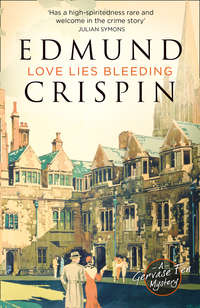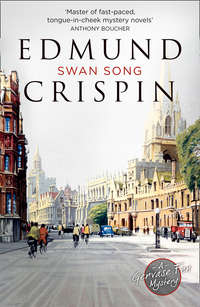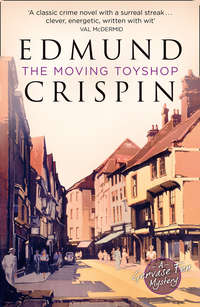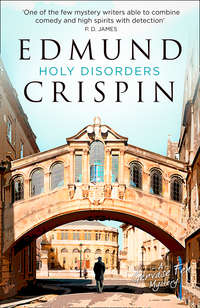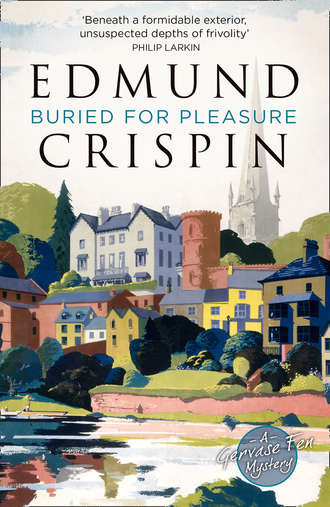
Полная версия
Buried for Pleasure
Fen rummaged in his mind, seeking not for that book of Mr Judd’s which he thought the best, but for the one which Mr Judd was likely to cherish most. ‘The Screaming Bone,’ he said at last.
‘Admirable!’ said Mr Judd, and Fen was pleased that his diagnosis had been correct. ‘I’m so glad you enjoyed that one, because the critics were very down on it, and yet I’ve always thought it the finest thing I’ve done. Mind you, the critics are down on all my books, because they haven’t any psychology in them, but they were particularly harsh about that one… You’re very perceptive, Professor Fen, very perceptive indeed.’ He beamed approval. ‘Still, we mustn’t waste time talking about my nonsense,’ he concluded insincerely. ‘Where are you heading for?’
‘I think’ – Fen glanced at his watch – ‘that it’s about time I was strolling back to the village.’
Mr Judd’s face fell. ‘What a pity – I have to go in the opposite direction, or we could have walked along together and talked,’ he said with great simplicity, ‘about my books. Still, you must come and have a meal with me – I live in a cottage only a quarter of a mile from here. What about lunch today?’
Fen said: ‘I’m afraid, you know, that I’m going to be very busy during the coming week,’ but Mr Judd’s disappointment was so manifest and poignant that he was moved to add: ‘But I dare say we can fit something in.’
‘Please try,’ said Mr Judd earnestly. ‘Please try. My telephone number is Sanford 13, and you needn’t hesitate to ring me at any time. Where are you staying?’
‘The Fish Inn,’ said Fen.
These words produced, unexpectedly enough, a marked change in Mr Judd. A new light appeared in his eyes – a light which Fen could not but associate with the more disreputable antics of satyrs in classic woods. In tones of reverence he said:
‘The Fish Inn… Tell me, have you come across that beautiful girl?’
‘The blonde?’
‘The blonde.’
‘Well, yes. She brought me my early morning tea.’
Mr Judd drew in his breath sharply.
‘She brought you your tea,’ he said, somehow investing Fen’s prosaic statement with the glamour of a phallic rite. ‘And was she wearing that powder-blue frock?’
‘I can’t really remember,’ said Fen vaguely. ‘It was something tight-fitting, I think.’
‘Tight-fitting,’ Mr Judd repeated with awe. He looked at Fen as he might have looked at a man who had lit a fire with bank-notes. ‘Do you know, I think she’s the most beautiful girl I’ve ever seen… Do you think she reads my books? I’ve never dared ask her.’
‘I doubt if she’s intelligent enough to read anyone’s books.’
Mr Judd sighed. ‘It’s just as well, perhaps,’ he said, ‘because she mightn’t like them…’ He veered from the topic with obvious reluctance. ‘Well, well, I mustn’t keep you.’
‘Don’t forget your revolver,’ said Fen.
‘No, I’d better not do that. Apart from anything else, I haven’t got a licence for it.’
‘And by the way – what is the point of throwing it into the pond and pulling it out again?’
‘That,’ Mr Judd explained, ‘is because the murderer wants to give the impression that he left it there at the time of the murder, and only retrieved it a good deal later, for fear of its discovery. The detective, of course, finds it somewhere quite different.’
‘But why should the murderer want to give that impression?’
Mr Judd became evasive. ‘I think you’d better read the book when it comes out. I’ll send you a copy… You realize about the coat, of course. It belongs to the victim, and the murderer wears it inside out so that when he carries the body the coat gets bloodstains on it where they ought to be, on the inside.’
‘Yes,’ said Fen. ‘Yes, I’d grasped that.’
‘Very quick of you. Well, you’ll let me know when you can pay me a visit, won’t you? I shall look forward to it, look forward to it enormously. I live a very solitary life, because there’s no one intelligent to talk to in Sanford Angelorum except the Rector, and his interests are confined to theology and birds and gardening, about all of which his information is tiresomely complete. Yes, you must certainly come and have a meal, and I shall be interested to hear any criticisms you may have to make about my books… Yes. Well, goodbye for the present.’
‘Goodbye,’ said Fen, shaking him by the hand. ‘I’ve very much enjoyed meeting you, and I hope I didn’t interrupt your test.’
‘Not in the least,’ Mr Judd assured him. ‘All I had left to do was to take the body into the village and put it on top of the War Memorial… Well, then, I shall hope to be seeing you.’
Chapter Five
They parted cordially, Mr Judd to retrieve his revolver and Fen to return to the village, full of regret at having missed seeing Mr Judd hoisting an imaginary corpse on to the War Memorial, and speculating on Mr Judd’s murderer’s motives in performing this laborious and public act.
He had reached the point provisionally identified as Sweeting’s Farm, and had worked out a rambling, intricate theory about Mr Judd’s murderer which involved the propinquity of an expatriate tulip-grower from Harlingen, when he saw approaching him, at a slow and thoughtful pace, the self-styled Crawley, who was now wearing a tweed cap and a tweed knickerbocker suit and carrying a fishing-rod in a manner which suggested that he was unused to it.
The conviction of having seen or known this man in some other context returned to Fen with redoubled force. He decided to accost him and, if possible, resolve the problem.
In this project, however, he was over-sanguine. The man looked up, observed his purposeful approach, glanced hurriedly about him, and in another moment had bounded over a stile and was hastening precipitately away across the field to which it gave access.
Shaken at being thus obviously avoided, Fen halted; then resumed his walk in a less cheerful mood. At one time and another he had made contact with various persons whom the law regarded with disfavour, and it was not impossible that ‘Crawley’ was one of them. In that case Fen had a responsibility for preventing whatever mischief might be contemplated – only the trouble was that he could not be sure that any mischief was contemplated…
He inspected the miscellaneous lumber-room of his mind in the hope of enlightenment, but vainly. He was still inspecting it, still vainly, when he arrived back at the inn.
His walk had taken him longer than he imagined, and it was already ten past eleven. The bar, however, got little custom before midday, and it was empty except for Myra, for the blonde, and for a sullen-looking Cold-Comfort-Farmish sort of man who was looming across at Myra and speaking slowly but with great vehemence.
‘I’ll ’ave ’ee,’ he was saying, ‘I’ll get ’ee, see if I doan’t.’
He pointed a dramatic finger at Myra who, nevertheless, did not seem much perturbed. ‘Don’t be so ruddy daft, Sam,’ she said.
‘I doan’t mind you’m being a barmaid,’ the Cold-Comfort-Farmish man resumed graciously. ‘I’m not one o’ your proud ’uns. Come on, Myra, be a sport. ’Twoan’t take not five minutes.’
Myra, unmoved by this promise of despatch, indicated Fen.
‘You’re making a fool of yourself in front of the gentleman, Sam,’ she said. ‘Finish your drink like a good boy and go back to the farm. I know you didn’t ought to be here, and you’ll cop it if Farmer Bligh finds out.’
The passionate rustic turned upon Fen a look of intense hatred, emptied his glass, wiped his mouth, muttered something derogatory to womanhood and strode out of the bar. In a moment he reappeared outside the window, which was slightly grimy, traced on it with his forefinger the words I LOVE YOU in reverse, so that they could be read from inside, glowered at them all, and went away.
‘That’s clever,’ said Myra, in reference apparently to the calligraphic feat. ‘He must have been practising it at home.’
‘Ah,’ said Fen non-committally.
‘Of course, Sam, he’s a chronic case – been carrying on like that for nearly two years now. It’s flattering in a way, but I can’t think how he doesn’t get sick of it.’
‘I suppose,’ said Fen, with hazy recollections of novels about bucolic communities, ‘that time doesn’t mean very much to him.’
‘What would you like to drink, my dear?’
‘A pint of bitter, please. And you?’
‘Oh, thank you, sir. I’ll have a Worthington, if I may.’
Fen settled on a stool by the bar, and while they drank talked to Myra about the people he had met in Sanford Angelorum.
Of Diana he learned that she was an orphan – the daughter of a former local G.P. who had died almost penniless through never sending in bills – that she was much liked by the local people, and that she was reputed to be in love with young Lord Sanford.
Of young Lord Sanford he learned that he was in his last year at Oxford, that he was a zealous Socialist, that he lived not in Sanford Hall itself but in the dower-house attached to it, that the local people would have liked him better if he had not been so conscientiously democratic, and that he might or might not be going to marry Diana.
Of Sanford Hall, he learned that young Lord Sanford had presented it to the nation, and that the nation had promptly turned it into a mental asylum run by the Home Office.
Of Mr Judd, he learned that he kept himself to himself.
Of Myra, he learned that her husband had died five years previously, and that she liked working in pubs.
Of Mr Beaver, he learned that he was a man of great initial determination but little staying-power.
Of Jane Persimmons, he learned that she was very quiet and reserved, that she had not disclosed her business in the village, that Myra liked her, and that she was fairly certainly not well off.
‘Then she’s a stranger in the district?’ Fen asked.
‘Yes, my dear. And the man is, too – Crawley, I mean. Have you seen him yet?’
Fen said that he had.
‘He’s a queer one,’ Myra went on. ‘Come here three days ago. Off on his own all day and every day – sometimes doesn’t even have breakfast. Says he goes fishing, but no one ever comes here to fish: there’s nothing in the Spoor but two or three minnows. And anyway, it’s obvious he knows no more about fishing than my backside. He’s a mystery, he is. Jacqueline mistrusted him from the start – didn’t you, Jackie?’ she said to the blonde barmaid.
Jacqueline, who was patiently polishing glasses, nodded and favoured them with a radiant smile. Fen noted, for Mr Judd’s future information, that she was wearing a plain black frock with white at the wrists and neck, and a rather beautiful old marcasite brooch.
Myra was regarding her with considerable fondness.
‘Isn’t she lovely?’ said Myra with proprietary pride. ‘Talk about dumb ruddy blondes.’
The dumb ruddy blonde, unembarrassed, glowed at them again, like a large electric bulb raised gently to its fullest power and then as gently dimmed.
‘And she’s everything you imagine blondes with figures aren’t,’ said Myra. ‘Goes to church regular, looks after her pa and ma in Sanford Morvel, doesn’t smoke or drink, and hardly ever goes out with men. But, of course, the only thing people want to do is just look at her – almost the only thing, that is,’ Myra corrected herself in the interests of accuracy.
Jacqueline smiled exquisitely a third time, and continued peaceably to polish glasses. A customer came in, and Myra abandoned Fen in order to attend to him. At the time of Fen’s return to the inn, all had been quiet. But now a light tapping from some other quarter of the building indicated that Mr Beaver’s interregnum, whatever might have been its cause, was over. The tapping grew rapidly in vehemence, and was soon joined, fugally, by other similar noises.
‘My God,’ said Myra. ‘They’re off again.’
Fen thought the moment appropriate to demand an explanation of the repairs.
‘It’s quite simple, my dear,’ said Myra. ‘In the normal way we only get the locals in here, and, of course, that means the pub doesn’t make much money. So Mr Beaver decided he’d like to turn it into a sort of roadhouse place, swanky-like, you know, and expensive, and get people to come here in their cars from all over the county.’
‘But that’s a deplorable ambition,’ Fen protested.
‘Well, you can understand it, can’t you?’ said Myra tolerantly. ‘I know there’s some as say the village ought to stay unspoiled, and all that, but it’s my opinion that if people aren’t allowed to make as much money as they can we shall all be worse off.’
Fen considered this fiscal theory and decided that, subject to a good deal of qualification, there was something in it.
‘But still,’ he said, ‘it does seem a pity. You know the sort of customers you’ll get; loud-voiced, red-faced men with Hudson Terraplanes and toothbrush moustaches, and little slinky girls with geranium lips and an eye to the main chance, smoking cigarettes in holders.’
Myra sighed a little at this vision of the coming Gomorrah, but – since unlike Fen she was not prone to aesthetic bigotry – did not seem, he thought, to be seriously dismayed.
‘Anyway,’ she said, ‘it’s their pub to do what they like with. They tried to get a licence for the renovations, but the Ministry refused it. So they’re doing the whole thing themselves.’
‘Doing it themselves?’
‘There’s a regulation, you see, that if you don’t employ workmen, and don’t spend more than a hundred pounds, you can do up your house, or whatever it is, yourself. Mr Beaver’s got his whole family at it, and some of his friends drop in now and again to lend a hand.’
‘Surely, though, it’s a job for an expert.’
‘Ah,’ said Myra sombrely. ‘You’re right there, my dear. But that’s Mr Beaver all over. Once he gets an idea into his head, nothing’ll stop him. And if you ask me—’
But what more she would have said Fen never learned. Even as she spoke, he had been conscious that a large and noisy car was pulling up at the door of the inn.
And now, with the consciously grandiose air of a god from a machine, a newcomer strode into the bar.
Chapter Six
The newcomer was a man of between thirty and forty, though a certain severity of expression made him seem rather older. He was tall and stringy, with a weather-beaten complexion, a long straight nose, bright, bird-like eyes, and thin brown hair which glistened with bay-rum; and he wore jodhpurs, riding-boots, a violent check hacking coat, and a yellow tie with horses’ heads on it. In his hand he carried a green pork-pie hat with ventilation holes in the top, so that it looked as if someone had been shooting at him.
He stalked to the bar, rapped on it, and demanded peremptorily to be told if Professor Fen were available.
‘I am Fen,’ said Fen.
The newcomer’s manner changed at once to one of great affability. He took Fen’s hand and joggled it up and down prolongedly.
‘My dear sir,’ he said, ‘this is a very great pleasure. Damme yes. Delighted, and all that… What are you having?’
‘Bitter, I think.’
‘A pint of bitter, Miss, and a large Scotch for me.’
‘You are Captain Watkyn?’ Fen asked mistrustfully.
‘You’ve got it in one, old boy,’ said Captain Watkyn with enthusiasm; it was as though he were commending Fen for the solution of a particularly awkward riddle. ‘The old firm in person, at your service now as always… Well, bungho.’
They drank.
‘It’s a good thing you’re a drinking man,’ Captain Watkyn added pensively. ‘I had to act for a T.T. once – Melton Mowbray, I think it was – and between ourselves, I had a pretty sticky time of it.’
‘Did he get in?’
‘No,’ said Captain Watkyn with satisfaction, ‘he didn’t. Mind you,’ he went on hurriedly, perceiving in this anecdote an element which might be interpreted to his own disadvantage – ‘mind you, he wouldn’t have got in even if the King – God bless His Majesty – had been sponsoring him… I tell you what, we’ll go and sit over by the window, where there’s some air.’
Carrying their drinks, they moved to the embrasure he had indicated and settled down there, Captain Watkyn with the relieved sigh of one who, after long and tedious journeyings, has returned home.
‘Snug little place,’ he observed, looking about him. ‘Might be a bit quieter, though, mightn’t it?’
Fen agreed that it might.
‘Well, never mind,’ said Captain Watkyn consolatorily, as though it had been Fen who had complained. ‘You might be very much worse off, if I know anything about it… Well, now, sir, you must let me have your instructions.’
‘What,’ Fen asked, ‘has been happening so far?’
‘A great deal,’ Captain Watkyn replied promptly. ‘A great deal has been happening. In the first place, I’ve induced ten people to nominate you – they’re a job lot, but they’re ratepayers, which is the only thing that matters. So that’s settled. And then, the posters and leaflets have arrived this morning from the printer. He’s taken a devil of a time doing them, but that’s all to the good.’
‘How is it all to the good? I don’t see—’
‘The point is, old boy,’ Captain Watkyn interrupted, ‘that you get quite an advantage by starting your campaign late. You acquire the charm of novelty. Start too early, and you’ll find people get sick of seeing your silly face peering at them from the hoardings (no offence meant). Now, you’re going to come down on them,’ he said, waxing suddenly picturesque, ‘like the Assyrian on whatever it was. They’ll be bowled over. They won’t have a chance to look about. Then along comes Polling Day, and you’re in.’
‘Yes,’ said Fen dubiously. ‘I dare say that’s so.’
‘You may depend on it, old boy. The old firm knows what it’s doing, believe you me. Now then, we must get down to brass tacks. The posters have been distributed, and they’ll be up by tomorrow.’
‘What is on them?’
‘Well, your photograph, of course,’ Captain Watkyn replied dreamily. ‘And underneath that they say: “Vote for Fen and a Brave New World”.’
‘I scarcely think—’
‘Now, I know what you’re going to say.’ Captain Watkyn raised one finger monitorily. ‘I know just exactly what you’re going to say. You’re going to say that’s exaggerated, and I agree; I’m with you entirely, make no mistake about that. But we’ve got to face it, old boy: these elections are all a lot of hocus-pocus from beginning to end. It’s what people expect. It’s what people want. And you won’t get into Parliament by saying: “Vote for Fen and a Slightly Better World if you’re Lucky”.’
‘Well, no, I suppose not… All right, then. What about the leaflets?’
‘I have some here.’ Captain Watkyn groped in his pocket and produced a handful of primed matter, which he passed to Fen. ‘The Candidate Who Will Look After Your Interests’ it said on the outside.
Fen studied it bemusedly, while Captain Watkyn went off to get another round of drinks.
‘You’ll like that, I know,’ Captain Watkyn said complacently on his return. ‘It’s one of the best things in its line I’ve ever done.’
‘But all this… it isn’t what I wrote to you.’
‘Well, no, not exactly what you wrote to me,’ Captain Watkyn admitted. ‘But you see, old boy, it’s no use trying to stray away from the usual Independent line: you’ll get nowhere if you do.’
‘But what is the usual Independent line?’
‘Just Judging Every Issue on its Own Merits: Freedom from the Party Caucus: that sort of thing.’
‘Oh. But look here: this says I advocate the abolition of capital punishment, and really, you know, I’m not at all sure that I do.’
‘My dear sir, it doesn’t matter whether you do or not,’ said Captain Watkyn with candour. ‘You must rid yourself of the idea that you have to try and implement any of these promises once you’re actually elected. The thing is to get votes, and with an Independent candidate you have to fill up election pamphlets with non-Party issues like capital punishment, because the only thing you say about major issues is that everything will be Judged on its Own Merits.’
‘I see. Then when I make speeches I have to stick to these non-Party things?’
‘No, no,’ said Captain Watkyn patiently, ‘you mustn’t on any account do that. You must talk a great deal about the major issues, but you must keep to pious aspirations, mainly.’ An idea occurred to him. ‘Let’s have a test. Imagine I’m a heckler. I say: “What about exports, eh? What about exports?” And your reply is—’
Fen considered for a moment and then said:
‘Ah, I’m glad you asked that question, my friend, because it deals with one of the most important problems facing this country today – a problem, I should add, which can be only imperfectly solved by any of the rigid, prejudiced Party policies.
‘“What about exports?” you say. And I reply: “What about imports?”
‘Ladies and gentlemen, there is no need for me to talk down to you. Politics are a matter of common sense – and common sense is that sphere in which ordinary men and women excel. Apply that criterion to this question of exports; cut through the meaningless tangle of Party verbiage with a clean, bright sword. And what do you find? You find that exports mean imports and imports mean exports. If we wish to import, we must export. If we wish to export, we must import. And the same applies to every other people, of whatever race or creed. The matter is as simple as that.
‘“Simple,” did I say? Yes, but vitally important, too, as our friend so rightly suggests. All of us want to see England prosperous; all of us want to build for our children and our children’s children a future free from the hideous threat of war. And I’m sure you won’t consider it a selfish aspiration if I say that all of us would like to see a few years of that future ourselves. And why not? It’s a great ideal we’re fighting for, but it isn’t an impossible ideal…
‘Ladies and gentlemen, the world is at the cross-roads: we can go triumphantly forward – or we can relapse into barbarism and fear. And it is for you – everyone of you – to choose which way we shall go.
‘Well, sir, I think perhaps that answers your question. There may be some points I’ve missed, as the monkey said when he fell over the hedgehog…’
Captain Watkyn was professionally impressed.
‘You’re a natural, old boy,’ he said soberly. ‘Can you keep that sort of thing up?’
‘Indefinitely,’ Fen assured him. ‘The command of cliché comes of having had a literary training.’
‘Then we’re in the money,’ said Captain Watkyn. ‘Here, we must have another drink on that.’
They had another drink, and Captain Watkyn, sighing contentedly, said:
‘Well, I don’t mind telling you now, Professor Fen, that I was a bit nervous at first about how you were going to turn out. I’ve had some queer customers to handle in my time, and sometimes it’s been touch-and-go whether they could put a complete sentence together impromptu. Thank God we don’t have to worry about that.
‘Now let’s map out a plan of campaign. My idea, in addition to the regulation meetings, is to make a separate appeal to each section of the community.’
‘In what way?’
‘Well, I’ve been over the ground pretty thoroughly,’ said Captain Watkyn, ‘and I think I’ve got a fair notion of what we’re up against. This is an easy constituency in a way, because it’s completely apathetic: half the people won’t vote at all, for anyone. And a good proportion of that half are the women. These country women tend to think the whole thing’s a lot of idiotic humbug suited only to men, and I won’t say,’ Captain Watkyn added handsomely, ‘that I think they’re far wrong… Anyway, we don’t have to appeal to the women so much as we should elsewhere, so you can tone down the brave-resourceful-queueing-housewife-and- mother angle.’
‘And that leaves what?’
‘It leaves the farmers and farm-labourers, chiefly. Do you know anything about farming?’
‘Nothing whatever.’
‘It’s just as well, perhaps. Your best line with them will be to attack the Ministry of Agriculture, which they all detest. I’ll try and collect some actual local cases of meddling for you to use, but you can always get on in the meanwhile with the usual man-on-the-spot-knows-a-sight-more-about-the-job-than-a-pack-of-Civil-Servants-in-Whitehall angle.’


